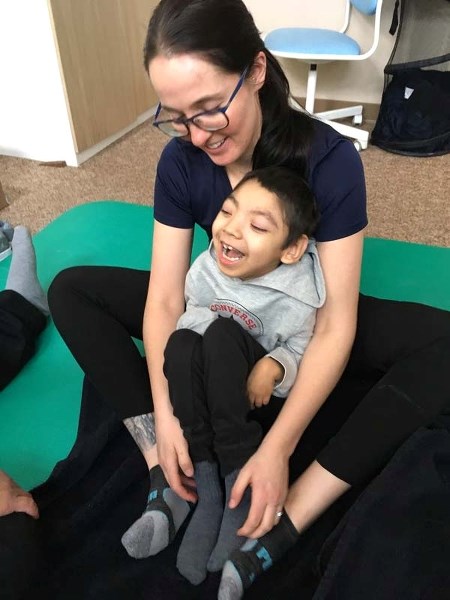Talks are underway to save a therapy program from having to abruptly shut its doors at the end of the month.
Twelve families from Stoney Nakoda Nation were facing uncertain futures regarding the care for their special needs children who have been receiving treatment at a Cochrane-based therapy center.
On March 19, Williams Consulting Child First program announced its federal funding was pulled from the First Nation’s program, which opened its doors in Cochrane seven months ago to specifically address the needs of the 12 children.
The explanation for the cut in funds, provided through Jordan’s Principle, by Indigenous Services Canada (ISC) was that the Stoney Health Services (SHS) were hoping to provide a similar program on the reserve.
“Williams Consulting was compensated for the services provided in the 2017-2018 fiscal year. Now, Stoney Health Services is providing these services in the community,” said Maryse Durette, senior media relations adviser.
However, Andrea Williams, the founder of the program, said she doesn’t know of any program on the reserve that matches the services her’s provides. In any case, she questions why both programs couln’t be funded.
“First Nation health authority, because they’re primarily on the reserve, have decided ‘oh we’re going to try a different model.’ Well why stop funding something that’s been working?” Williams said. “We know they don’t have a program like this.”
Now, after recent talks, Stoney Health may look at routes to take on Williams Consulting so that there will be no interruption in service.
“We’re going to make sure the services are continued for the parents and the children,” said Ken Christensen, Stoney acting tribal administrator. “I myself have a handicapped child. We’re not going to let bureaucratic battles stop services to the children.”
Williams’ program was designed to address the needs of 12 families who came to her consulting firm months ago desperate for more intense treatment for their children. When it began operating it sought to remove all barriers – even transporting the children to Morley and back.
“We used to get funding through FSCD (Family Supports for Children with Disabilities), so we’re used to jumping through so many hoops,” said Chanda Hunter, who has nine-year old, Gavin, receiving treatment from Williams Consulting. Hunter said the program finally made it easy to access the much needed treatment for her son. “He was comfortable there, which is really rare for him.”
“It’s really been troubling to hear,” said Chris Pegram, Gavin’s father, referring to the original announcement.
The children receiving the care live with severe learning disabilities including being completely or nearly non-verbal, severe delays in motor skills and often are on the autism spectrum.
The program was starting to establish the daily routines of children such as regulating their emotions, focusing the kids’ train of thought to avoid overstimulation and developing motor skills to manage basic tasks such as going to the washroom.
Some of the children because they are non-verbal or on the cusp of it, sometimes physically act out to communicate, which could be seen as aggression.
Jessica Currie, one of the 10 staff members who could face a layoff said those were among the habits the program was working on improving so the children could grow into adults with the ability to control their emotions.
“We were so focused on those fundamental things like toilet training, trying anything and everything. And now they’re not going to get anything maybe,” Currie said, pushing through tears, adding that she fears she’ll later hear of the children’s suicides or incarcerations when the children become teenagers.
“(They’re) going to be on the news for drugs or jail or anything because anytime (they’re) mad (the child) doesn’t communicate because (the child) doesn’t have the tools to deal with (they’re) anxiety.”
The final decision of the talks was not available at press time. The Cochrane Eagle will update online.




